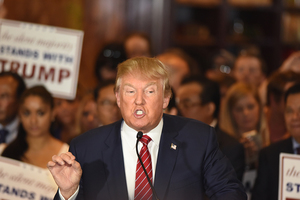 Who won Tuesday night's fifth GOP Presidential Nominee Debate? At the end of the two-hour and 45-minute event, it was a mixed bag at the Venetian Casino in Las Vegas. CNN was the host.
Who won Tuesday night's fifth GOP Presidential Nominee Debate? At the end of the two-hour and 45-minute event, it was a mixed bag at the Venetian Casino in Las Vegas. CNN was the host.Front-runner Donald Trump didn't dominate. Instead, he used his trademark one-liners and humor to fend off rather weak thrusts from his eight opponents and for that performance; we place him on Caesar's throne for the moment.
Still, give former Florida Gov. Jeb Bush an "attaboy" for his efforts. He turned in his best performance to date but it still will not be enough to raise him from the cellar in most national polls where he has been for the last four months.
Bush sparred with Trump in one of the livelier parts of a lengthy but rather lukewarm debate session.
There were no fireworks as CNN promoters had earlier promised there might be between Trump and his nearest rival, Texas Sen. Ted Cruz.
Despite Talking TV Heads' predictions that Trump's views on Muslim immigration would crimp his favorable poll rating, Trump today gained and is now at 41 percent, according to a new Monmouth University poll. The Washington Post and ABC News placed Trump at 38 percent. Cruz remains 10 points behind.
Bush and Trump exchanged sharp words on Trump's widely publicized plan to temporarily ban Muslims from entering the United States. They also jostled on Trump's earlier comments on going after family members of ISIS terrorists.
Those views were "another example of his lack of seriousness," Bush said.
Visibly annoyed, Trump kept his cool. He replied, "I think Jeb is a very nice person, a very nice person. But we need toughness (in the White House)."
Bush tried to butt in but Trump snapped, "You're trying to building up your energy but it's not working."
Bush shot back, "Donald, you're not going to be able to insult your way to the presidency."
Florida Sen. Marco Rubio and Cruz, meanwhile, tussled over a string of issues. They included the National Security Agency's surveillance program, immigration reform and how the United States should respond to dictators in the Middle East.
Rubio blasted Cruz for voting for the USA Freedom Act -- a law that makes it more difficult for the government to access people's phone records.
"This is a radical jihadist group that is increasingly sophisticated," said Rubio. "We are at a time when we need more tools, not less tools."
Cruz called Rubio's accusation false. He said the law ultimately "strengthened the tools of national security and law enforcement to go after" terrorists.
Cruz then hit Rubio on one of the Florida senator's biggest political vulnerabilities: Rubio's work on the "Gang of Eight" comprehensive immigration reform bill.
Calling the legislation a "massive amnesty plan," Cruz accused Rubio of working with Democrats to give Obama a "blanket authority" to accept refugees.
"He was fighting to grant amnesty and not to secure the border," Cruz argued. "I was fighting to secure the border."
Rubio hit back. He accused Cruz of supporting the legalization of people who are in the United States illegally. Rubio also slammed Cruz for backing a controversial H-1B visa program, which supports immigration of highly skilled foreign workers.
Cruz and Rubio also split on whether the turmoil in the Middle East would ease if Syrian President Bashar al-Assad was removed from power.
"If we topple Assad, the result will be ISIS will take over Syria and it will worsen U.S. national security interests," Cruz said.
Rubio disagreed. While the United States must sometimes work with "less than ideal governments," Assad was simply an "anti-American dictator," Rubio said.
Even New Jersey Gov. Chris Christie showed new aggressiveness Wednesday night, getting in a jab at President Barack Obama at the same time.
Asked by CNN moderator Wolf Blitzer whether he would shoot down a Russian plane that might stray into a no-fly zone over Syria, Christie replied, "Yes we would shoot down the planes of Russian pilots if they were stupid enough to think that this president is the same feckless weakling that we (now) have in the White House."
As the fifth of nine scheduled GOP debates drew to a close Tuesday night, all eyes turned to the calendar where two crucial primaries are scheduled in February. They are Iowa, tentatively set for Feb. 1 and New Hampshire on Feb. 9, although that date, too, isn't set in stone.
The New Hampshire Primary, also known as the first-in-the-nation primary, will be the first actual primary vote-taking place after the Iowa Caucuses, which are not technically the same as a primary.
Unlike Iowa, where the caucus chooses delegates to the county convention, which then choose delegates to a state convention, and then the national convention, the New Hampshire primary chooses the delegates who will serve at the national party conventions which will select the nominee.
One of the main differences between a caucus and a primary is that a caucus is organized by the political parties, whereas a primary is organized usually by the state board of elections, as a regular election would be.
The New Hampshire primary takes place in the state of New Hampshire and is designed to give an early voice to the New England region, much like the Iowa Caucus gives an early voice to the Midwest.
Political pundits note New Hampshire often differs from Iowa ideologically, which often gives an advantage to candidates who may not play well in the Midwest.
Since 1952, the primary has been a major testing ground for candidates for both the Republican and Democratic nominations.
Candidates who do poorly frequently drop out, while lesser-known, underfunded candidates who do well in New Hampshire suddenly become serious contenders, garnering large amounts of media attention and campaign funding.
And that's the way it is at this moment.

 By
By 